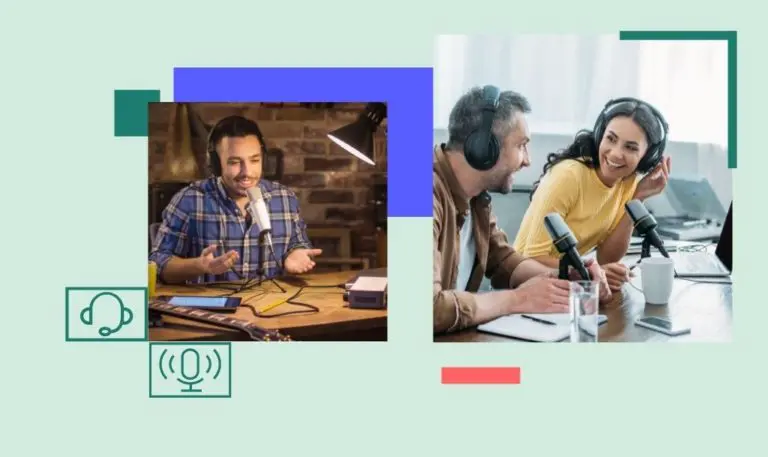Matt Strach
As BLEND’s Director of Enterprise Marketing, Matt brings 14 years in the audio and video production industries to help businesses execute successful voice and video localization campaigns.


The popularity of podcasts has increased exponentially in recent years. They have entered the world of global mainstream media in areas as diverse as business, education, culture, comedy, news, health, and more. Podcasts provide a convenient and entertaining way for businesses to engage with their customer base.
As of April 2021, there were more than one million active podcasts and over 30 million podcast episodes available worldwide. This growing popularity is a result of podcasts being convenient and people’s preference for convenience. There’s a huge appetite for bite-sized chunks of information and entertainment that slot into busy lives. A perfect example of this is the fact that 22% of Americans enjoy listening to podcasts as they drive.
While these statistics are impressive, if you’re a podcast producer, it’s important to bear in mind that 75% of internet users don’t speak English. They can only engage with content when it is in their own language. Even internet users who have knowledge of more than one language are more likely to buy a product if they can research it or read about it in their native tongue. To take advantage of the fast-growing podcast market, it’s vital that you engage with these foreign-speaking audiences by creating multilingual podcasts.
To do this effectively and in a way that audiences can relate to involves an element of upfront or ongoing cost. However, the benefit of reaching potential listeners and customers in areas where podcasts are becoming ever more popular (such as India and South America) more than justifies this. If you’re convinced and want to reach this wider audience, avoid the temptation of relying on your average freelance, online translator – these don’t take localization into account. There is a real skill to producing a translated podcast that listeners around the world can relate to. As well as considering linguistic accuracy, you also need to take on board cultural differences. This is where podcast localization services become important. To help you create successful multilingual podcast content, take a look at these multilingual podcast tips.
When native-speaking hosts and translators are used for each episode, conversation or information sounds relevant and natural. While using free transcription software can save you money and time, it can’t replicate the work of experienced human translators. A native-speaking linguist is aware of cultural sensitivities, something a machine can’t do (at least at the moment!). This knowledge avoids unintentionally offending people or just being wholly unrelatable, losing you valuable listeners and prospective customers and clients. A native speaker also hits the right tone and knows just the correct turn of phrase or idiom to employ. By taking the trouble to use professional translators and native podcast hosts, your podcast is sure to retain the conversational tone of your original, no matter which language it’s been localized into.
Take the simple step of having a written script for your podcast episode. This makes the job of creating a multilingual version for media localization much easier. Do this yourself, or even better, use professional transcription services. Once your audio has been transcribed and carefully checked by our editors and reviewers, our transcription translators ensure it is localized for new audiences. If you want people to find your podcast, having a transcript is essential, as search engines can’t understand audio files without transcripts. With attention paid to search engine optimization (SEO), your podcast will quickly climb search engine rankings. Make further profitable use of your professional-quality transcription by adding it as text content to your blog and social media pages, making it accessible in a different form.
While a huge proportion of podcasts originate and are listened to in the US, you’re not going to appeal to a global audience if you draw inspiration solely from the states. To ensure listeners return to your podcast, make sure each episode resonates with a local audience whether this is through cultural references such as TV shows and music, figurative language, jokes they get, or dialects they recognize and feel comfortable with. For example, make a Spanish version for listeners in Spain and another for listeners in Mexico. This investment in localization will have a profitable return in the form of new audiences and markets.
You are probably a brilliant writer and an engaging host in your own language. Your local audience gets you and understands the essence of what you are saying. This essence and the subtleties of language may be lost, however, if you try and make your own translated podcasts. By using professional translation and localization services, what you are trying to say is retained along with the tone and style of your voice and content. Contextual and grammatical accuracy is ensured while idioms, phrases, and cultural references are correctly translated or replaced. A multilingual voice services provider also offers qualified and experienced native-speaking hosts for each of your target languages. This allows for different versions of your podcast to be created, each one explicitly designed for a specific market. By using this voice-over localization, your podcast remains compelling to listen to while retaining its relevance.
At BLEND, we understand that creating podcasts for the multilingual market and the cost involved might be pain points for you, so we aim to make the end-to-end process seamless. Around the world, podcast listening is becoming a daily activity for millions of people, and with our help, your podcast content becomes accessible to them. Not only will your multilingual podcasts acquire new listeners, but you’ll also increase your revenue and boost brand awareness.
Additional Resources
Read more about Best Localization Podcasts for Global Businesses
What our customers are saying